From near-death to fitness inspiration, the Freda Mooncotch-Al Kavadlo story
By Adrienne Harvey, SrPCC, RKC-II, CK-FMS
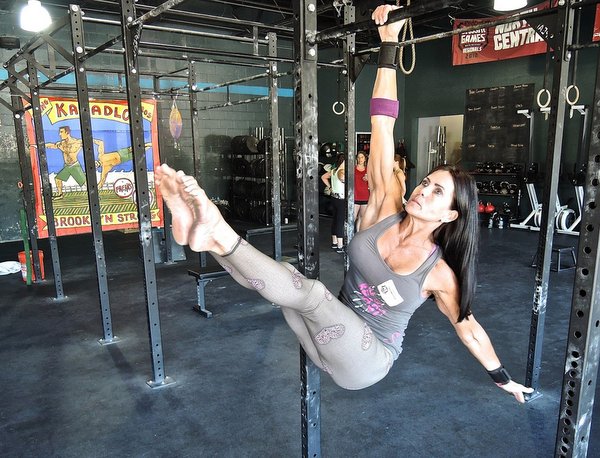
Dragon Door: How did you originally get interested in fitness?
Freda Mooncotch: I have been into fitness my whole life. I had eight brothers and sisters—nine of us kids counting me—and my parents got us started. We had a boat and I started waterskiing when I was about three. We went to Lake Shelbyville every weekend, and in the winter we would go snow skiing, bowling or to the health club to play racquetball. We were always very active, and as kids we were always getting sent outside to play. My Mom had us in dance, too—tap, ballet, and jazz. In grade school, I tried out for every sport even though I wasn’t very coordinated. I always was a bench warmer, but at least I got to be on the team!
Dragon Door: What brought you to the PCC?
Freda Mooncotch: I was sick for a couple of years with some really bad digestive problems, borderline Crohn's disease. We just recently found out that Crohn’s disease runs in our family after two of my aunts were diagnosed with it this year at the Mayo Clinic. I was so sick that I had to quit my job and move back home with my parents. For the first six months, I literally slept. The whole ordeal was just hell and I wouldn’t wish it on anyone. I could barely get out of bed. Every day I felt like I had been hit by a truck, and had concrete in my feet. It’s hard to describe how much physical pain I was experiencing. For about three years I went the alternative route, basically healed myself and tried all kinds of crazy things.
I started getting better and in December of 2013, my dad brought home a yoga magazine—I still remember the exact day. I had dabbled in yoga a little at the health club ten years before, and never really cared for it. But in this magazine, the ladies were doing really cool things like handstands and wrapping their legs around their heads. I remember thinking that they really looked fit and healthy. At the time I was just getting better, but still looked like crap and wanted to do something like what I saw in the magazine.
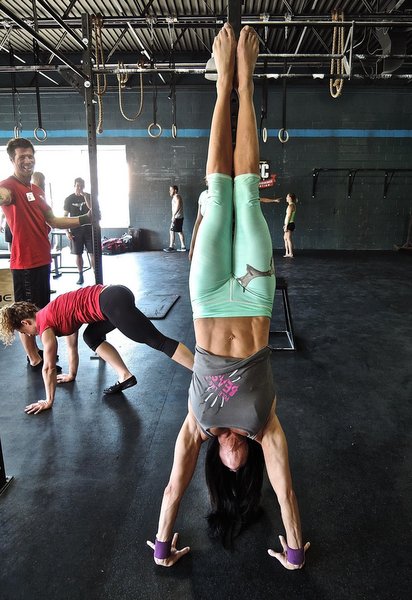
It was exactly the inspiration I needed, and helped me to focus on something other than being sick or getting well. So I started stretching and changed my very boring, monotonous training routine. Before, I was just doing weights and typical boring stuff at the health club. I was tired of it, but didn’t know about any interesting alternatives I could actually commit to. But now, instead of my regular routine I just started incorporating a lot of yoga poses and stretching. At first it was very painful because my joints were still being impacted by my digestive issues. I had a lot of inflammation. For a while, it was like Groundhog Day every day—I would try to do splits and sometimes it hurt so bad, that I would cry! But, I just kept at it, one day at a time.
In January of 2014, someone on Twitter mentioned
Al Kavadlo, and that I should check out what he was doing. I looked him up and immediately found his book,
Stretching Your Boundaries. I read the whole book, and kept it next to me while I did the exercises. That's when I started to do L-sits—even though I was so weak at first that I couldn’t even lift myself up. But, I just kept at it, every day.
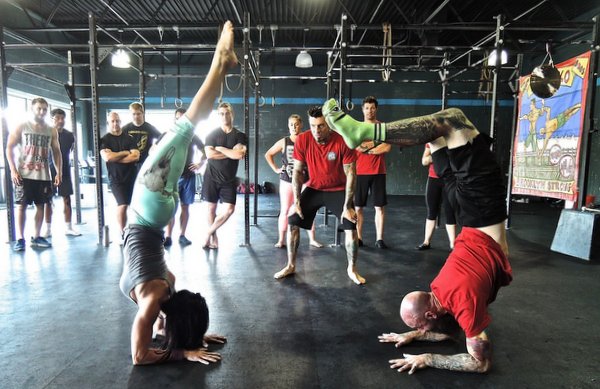
It’s hard to explain, but at the time Al symbolized something almost like a lighthouse. I was literally close to death, my body was so weak, and I was exhausted. I had just about lost all hope, and couldn't see the light at the end of the tunnel. And while I was slowly regaining my health, it was still touch and go. One week all seemed right with the world, and the next week I couldn’t even walk up a flight of stairs without my blood pressure dropping so low that I would feel like I was going to pass out. I felt like I had already done everything possible. I was starting to lose my spirit, but when I got a hold of
Stretching Your Boundaries, it renewed my faith. It was as if the universe was speaking through Al, and it kept me going! I just kept putting one foot in front of the other, and bought all of his other books too.
I started gaining strength and confidence while getting better. From January 2014 to May 2014, I only did yoga, stretching, and worked on handstands. I documented all of it on Instagram and I would say, "Al! Look what I did!" And he always responded! It was great to have someone encourage me because I was training in the basement alone, and didn’t have much energy to go out. I was isolated for a few years.
Just as I was getting better, my health declined again, but this time we finally figured out what I needed to do. Within three weeks, everything finally turned around for me. I think it was part of my healing process and my body was finally ready for the next step—because then I really started getting stronger. It was like a miracle. That being said, I had the fear of being back in bed the next week looming over me all the time. I wasn’t sure if my new-found health would stick. I refused to give up, and was determined that if I were going to die, I wanted to die happy doing what I love. I didn’t want to be remembered as sick and weak, so I kept going.
At the end of May, I saw some girls on Instagram doing yoga poses on a pole. I thought that was really cool, and wondered if I could do it. The next week (June), I signed up for a pole class and also started working on basic
calisthenics and elbow levers. A month later, I installed a pole in my basement and started to do assisted pull ups at the gym. When I got to the point where I could do one
pull up by myself, that was huge! I’d never even been able to do a chin-up before!
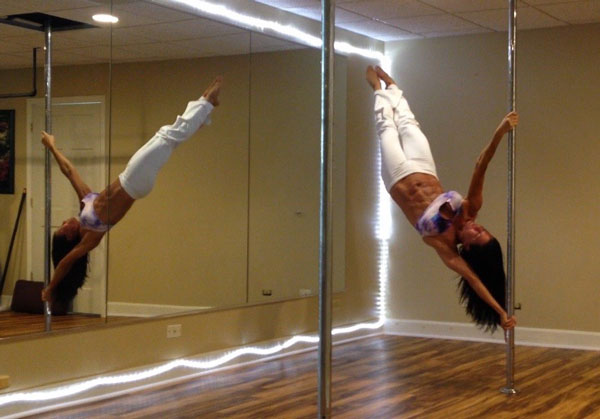
It is so cool to see where I am today compared to just a year ago—I’m now almost able to do the full expression of the
human flag! I have Al to thank for it. I wouldn't have kept putting one foot in front of the other while learning to master my body without his books and encouragement. In the process, I also learned how to master my mind and regained my self esteem, confidence, everything. I did a complete 180, and got a second chance.
Al has forever changed my life, and I want to do whatever I can to return the favor. In the darkest moments of my life, he told me that I could do it through his books, videos, Facebook page, and his social media responses. I never met him in person until the
PCC, but what he put out there every day impacted, inspired and changed my life. It was powerful! I think we all need inspiration like that in our lives. Al is so open in his books about his own challenges and digestive problems. He was so sincere and real. People need that.
I really went through hell, because at the same time I was in a troubled relationship—which added insult to injury. I am not sure what I would have done if I had not been so firmly grounded in calisthenics, it was my therapy. Without that outlet to deal with all the disappointment and pain, I don’t know what I would have done. I had also just started my pole journey which was additional therapy. My spirit had been kicked around so much over the past few years, but the butt kicking was how I got my focus. In a way it really was a gift, because I had to learn to discipline myself to gain control over my reactions to how life was coming at me. Now, I had an outlet to deal with it. Most people drink, or turn to self destructive activities like drugs to comfort themselves and end up addicted and much worse off. I didn’t want to do that to myself. I wanted to rise above it, transform and change my situation. It was a very painful process because I had to start working through a lot of things. I wanted change more than I wanted breath.
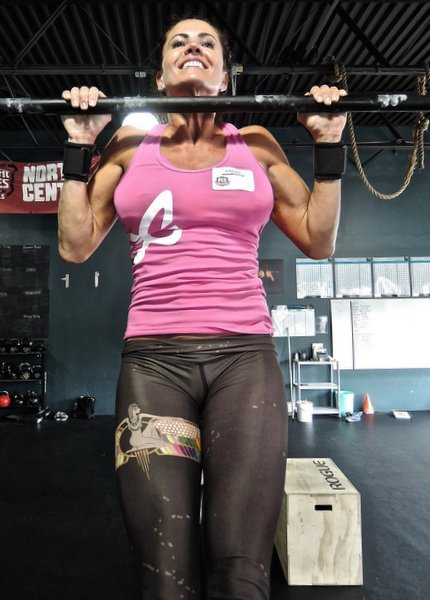
So, while I was being torn down and rebuilt from the inside, I was also being rebuilt physically through pole and calisthenics. I took my pain to the pole, set some goals and just went for it. I have literally been training for 5-6 hours a day. I made a goal to compete in May 2015, and won my first competition at that time. I had only been doing pole for about 11 months, but it’s amazing what you can do when you really focus.
Now that I’m not so angry and can reflect over the past few years, I realize I wouldn’t be here if not for all that I went through. Everything that happened to me has made me much wiser, and has given me that much more experience. And if I hadn’t been heavily emotionally invested in the guy I was seeing, I wouldn’t have ventured down this path, either. He was a professional athlete who was constantly getting injured. My heart went out to him because I could understand his frustration. I wanted to help, so while I was exploring how to get better, I kept coming across athletic performance,
lifestyle, and diet research. Long story short, I became really fascinated by all of it. This led me to start exploring human performance, diet, injury prevention, lifestyle—and it all started connecting.
If I hadn’t met him, and hadn’t cared so deeply, then I wouldn’t have become so focused on my diet, training, exploring different types of training, or studying how the brain works during training. It's really fascinating to explore what differentiates average people from world-class performers. It’s usually not talent, but really comes down to how you train and how you practice. I've learned so much about the power of the brain and lifestyle. Everything depends on how serious you are, your goals, and what you ultimately want to achieve.
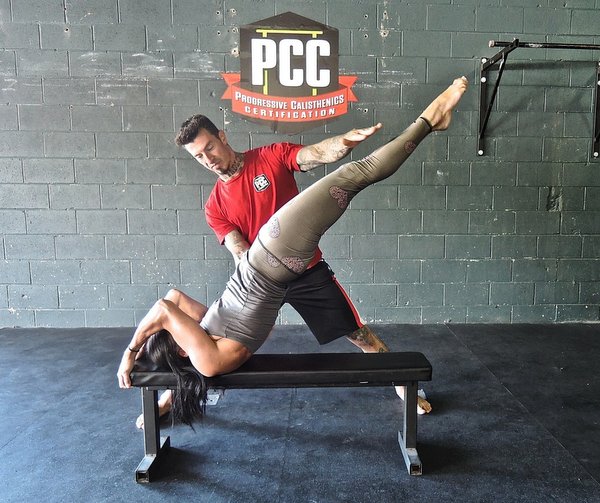
Calisthenics can be a great hobby, but if you really want to excel and become a professional world-class performer or successful business person there are certain things that you must do. I spend a lot of time researching these topics because they are fascinating to me. It all involves the brain, nerves, and cells—and how you must have a passion for what you’re doing. If you don’t, then you won’t stick with it though all of the mistakes, failure, and constant learning involved. If you aren't really passionate about something, then failure will kill your effort after just the first few attempts.
Dragon Door: In your research, what are the required traits or habits you’ve identified for world-class performers?
Freda Mooncotch: Passion and training. You've got to have the passion to do the training because of all the work, practice, and repetition involved. But this is true for all world-class performers, violinists, dancers, and even comedians. I was reading about Chris Rock and how he trains for a big performance by doing as many small venue events as possible. That's how he works through his material and decides what does and doesn’t work. No one pulls back the curtains on stuff like this because it’s not pretty, and as a society we romanticize the idea of someone having a talent they were born with. That idea really undermines all the hard work and sacrifices people make to be world-class performers. It also requires a huge support system and someone who really believes in what you're doing—otherwise it can easily just become another hobby.
Dragon Door: This is also important for people making healthier lifestyle changes. Most of us also need this kind of support for the mental and emotional side of starting towards a transformation which may be difficult for them to imagine at first.
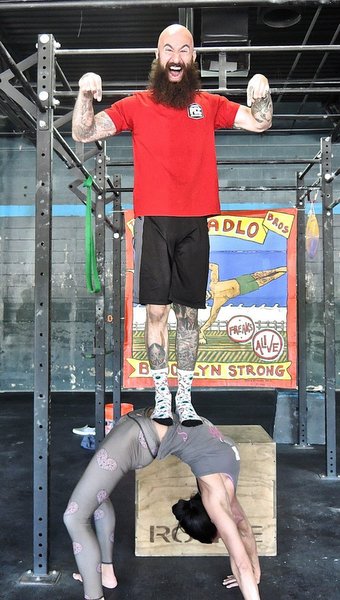
Freda Mooncotch: You need to surround yourself with people who inspire you, and who don’t bring you down. You definitely need passion, training, and good coaching—who you train with is huge.
Dragon Door: What do you look for in a good coach?
Freda Mooncotch: Find someone who you respect, and who has had experience as world class performer—so that they can actually speak from their experience. For me, in pole sport competition, I look for teachers who have won championships. They should be very patient, but also honest, I want to hear what I need to hear. Without knowing what I need to change, I can’t change it. And you want to change fast, instead of repeating the same mistakes over and over until they become hard to break habits. You want someone who can tell you what's wrong and why—all while being positive.
Dragon Door: What's your next goal?
Freda Mooncotch: Right now I am working towards opening my own fitness center and sharing the amazing experience of calisthenics. People are tired of just "working out". It's so hard for many people to get excited about working out when they’re struggling with their weight and busy with their jobs and families. I think people are tired of going to the gym and doing the same old boring thing on the treadmill, so I am trying to bring a really cool experience to all age groups. I want people to know that working out can be fun, and that you don’t have to be 20 to do it. I’m 43, and did my first muscle-up at the PCC. It was so cool to see all ages at the workshop, especially some of the older (and wiser) people over fifty. It was inspiring to see them do
muscle-ups, pull-ups, rollovers and human flags. Most people think that after 40 you’re dead or you start to die, but that’s not true, I’m just now beginning to really live!
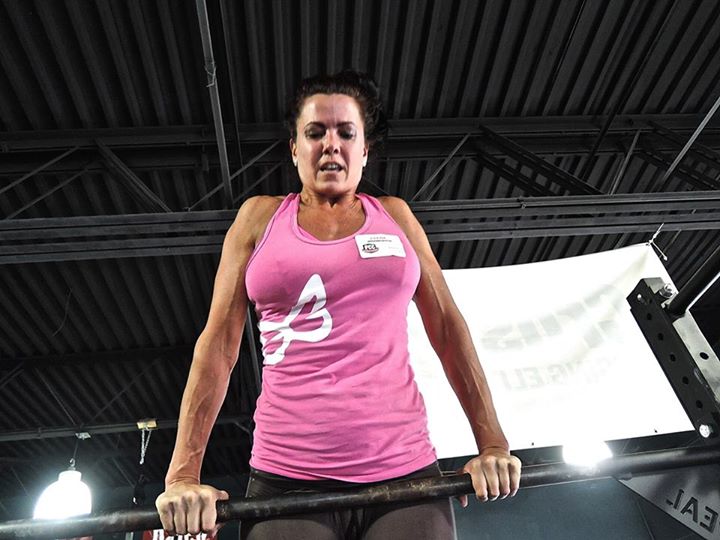
Dragon Door: During the interview, you’ve mentioned a number of calisthenics exercises, which one was your favorite to learn more about at the PCC?
Freda Mooncotch: The human flag—I can’t wait to get it! I just think it's the coolest thing to be able to extend your body straight out. It’s just so badass to be able to pop up into it and make it look fluid and easy. I’d love to be able to do a human flag on the street, that would make my day! And the pull-up, I love to do them, especially since I could never do them before my recent training. I used to try them with that assist machine with 60-70lb to help me, but now I can do 8-10 dead hang pull ups!
Back